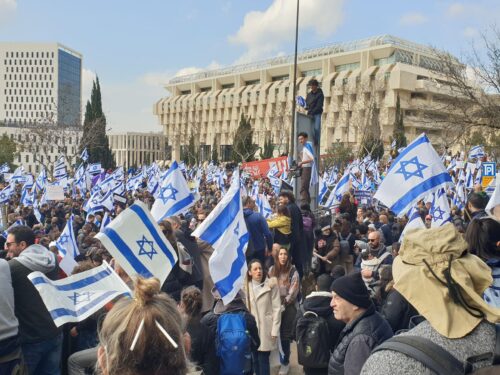
If you read IDSF HaBithonistim movement’s statement of beliefs you will find among other the following principle: “The IDSF HaBithonistim is not a political movement. It is open to any person who believes in its founding principles”. And what are these principles? The principles of the movement’s activity are exclusively anchored in Israel’s security concerns. Why then is the movement occasionally pegged as a “right-wing” movement? Because nowadays in Israel, Zionism has become a political concept. But it is precisely with the aim of debunking this misconception that the movement was founded.
The ideology tier vs. the action tier: do not mix them
The principle of neutrality is an important factor for the IDSF HaBithonistim movement in its dealing with the most important question of all: how to safeguard Israel’s security for generations to come. This type of issue cannot be pegged as politics, simply as it is an existential question that has a bearing on the lives of all Israelis and Jews across the globe.
According to the movement’s approach, the rationale at the basis of the question of Israel’s security is the fundamental belief in the rightful claim of the Jewish people to the land of Israel. In other words, this fundamental belief has no affiliation or leanings neither to the left nor to the right of the political map.
The politicization of Zionism stems from the unfortunate marriage in recent decades of these two tiers that ought to have remained separate – ideology and action. the ideology level may absolutely subscribe to the notion that the Jewish people are entitled to the entirety of the land of Israel whereas the action level may offer pragmatic solutions such as the withdrawal from parts of that land, so long as such a measure is deemed material for the long-term security of the State. However, once the notion of parting with sections of Israel rests on the fundamental assumption that the Jewish people had no right over that land to begin with, Zionism begins to disintegrate.
An illuminating example of the disparity between ideology and action is the story of the destruction of the Second Temple. Raban Yohanan Ben Zakai upon viewing the ruins of the temple chose to leave Jerusalem and in its stead, set the city of Yavneh as the Jewish spiritual center. Some sixty years later, Rabbi Akiva viewed those same ruins and as oppose to Raban Ben Zakai, concluded that in the face of such a reality of oppression, the Jews must revolt.
Looking at these two historic giants, can any one of them truly be accused of non-Zionism? The answer of course is no. Both Raban Ben Zakai and Rabbi Akiva had no qualms as to who has the rightful claim to the land of Israel, but each chose to respond and act in a different fashion.
This lesson is applicable to Israel today. We can uphold Zionism as our common cause as a people yet still support different diplomatic and security solutions. Once we come to realize that there is no contradiction between Zionism and opposing politics, and understand that Zionism is an ideology and not a political statement, we can bridge the gaps that are tearing us apart.
Leave politics at the door: the politicization of Zionism
At its inception, Zionism bred many approaches, the most prominent of which were the spiritual Zionism, diplomatic Zionism and religious Zionism. However, despite the differences among the various approaches, they were all driven by a common cause: the foundation of a national home for the Jewish people in the land of Israel.
In the formative years of the State of Israel, Zionism was at the consensus of the nation, and any opposition to this notion, if at all, was at the fringe of the discourse. It was only during the seventies and eighties of the 20th century that politics were attributed to Zionism and claims were voiced that it is not an ideology but a political statement.
The Politicization of Zionism also forced a shift in the public’s perception of the Israeli Defense Forces. If until this change the IDF was seen as a liberating army, once politics were attributed to Zionism many had begun to view the army as an occupying military. It is important to understand that this shift is not just semantic, but a deep perceptional shift with regard to the legitimacy of the Jewish people’s claim over the land of Israel.
If there is one thing that the opposition to Zionism had succeeded in doing was to put the notion that Zionism is not a fundamental ideology but a political stand in the minds of Jews themselves. This notion is an existential threat to the State of Israel for the simple reason that when the Israeli nation forgets why it is in the land of Israel, it can not muster the strength it needs to sacrifice and fight for its country.
That notion also drives wedges among the diaspora Jews. Presently, there are thousands of Jews around the world that are turning their backs on the State of Israel and its fundamental values. Zionism must return to center stage and the global Jewish community must be made to understand that they do not have to reject their Jewish identity in order to see a resolution of problems In fact, they must not do so.
No such thing as half an ideology: Zionism is a complete narrative
Many citizens of Israel attests that they “are Zionist, but…” Reservations are perfectly acceptable, and there is room for a variety of opinions on core issues pertaining to Israel and the Jewish diaspora. However, one cannot be half Zionist. Zionism is an acknowledgement of the rightful claim of the Jewish people over the land of Israel. One may either support this notion or oppose it – there is no middle ground here.
When there is an understanding that Zionism is a complete narrative, then it cannot be argued that the core of the land of Israel, which was the setting for the Jewish people’s ancient history, is an occupied territory over which Israel has no legitimate claim. This approach is dangerous ideologically and security-wise. Ideologically, it is a threat to the Zionist notion since how can it be claimed that only part of the land of Israel belongs to the Jews, whereas another part of it does not? In terms of Israel’s security, an immediate withdrawal from entire crucial swaths of land would leave Israel exposed without maneuvering space and the ability to undertake actions to ensure the country’s security and existence.
Is it rational to assume that Tel Aviv is rightfully a part of Israel whereas Shiloh in Judea and Samaria does not belong to it? A point to ponder for those who would uphold a partial view of Zionism – what difference should it make it the former was taken by Israel in 1948 while the latter – in 1967? The post-war borders of Israel are nothing but arbitrary. Would the claims regarding Judea and Samaria be any different if Israel would have taken over the area in 1948 as it did Tel Aviv? Or alternatively – what would be the claims if Israel had taken Tel-Aviv – and Jaffa at that – only in 1967? Would the bustling Israeli metropolis be considered an occupied territory as well? This notion is a fallacy.
As oppose to Zionism, which is a complete and sound ideology, anti-Zionism is full of holes; a flawed unmarketable product.
The question of Israel’s security is not political – it is existential
The perception according to which we are demanded to separate between our identity and values and the problems at hand and the solutions thereof is the bedrock of the IDSF HaBithonistim’s existence. This is the reason behind the movement’s non-political nature. This fundamental principle is also manifested legally, otherwise the movement could not have been registered as a non-profit foundation.
In order to comply with its stated political neutrality, the members of the IDSF HaBithonistim movement, although no longer in active military service, use their expertise that won them their ranks solely to comment on matters of national security without digressing to politics. We expect the same from Israel’s security establishment, whose task it is to ensure the security of Israel and the safety of its citizens, and thus must cleanse its hands of the political discourse. Sadly, many still choose to attribute questions of national security to left or right-wing politics, thus, rather than engaging in a true and sincere debate, a shallow and cliché-ridden exchange is forced upon us without any real solution. Rather than considering the structured and research-supported security approach as presented by the IDSF HaBithonistim regarding the proper measures to safeguard Israel’s security, the conversation centers around whether the movement is affiliated to the political right or not. For this reason precisely, the movement takes pains to remain politically neutral.
In the name of said neutrality, the IDSF HaBithonistim movement does not welcome into its ranks people who hold positions in the civil service. Granted, two members of the movement were recently appointed to important government roles – Maj. Gen. Yiftach Ron-Tal was appointed as project manager for the rehabilitation of the north, and Maj. Gen. Eli Marom (Cheney) was appointed as project manager for the rehabilitation of the south. Accordingly to the movement’s nature, the two are no longer active members of the movement.
Further proof of the movement’s neutrality can be found in the military security principles that guide it. Albeit at first glance these principles may seem as if they resound those of the political right, a review of public opinion shows that they in fact reflect the sentiments of the majority of the Israelis. Moreover – these same principles were upheld by more than a few past leaders of the political left.
Furthermore, as the IDSF HaBithonistim movement deals only in matters of security and does not engage in social, economic or legal issues, it is open to members of the public from the entire political gamut and as such may have members who identify with the movement’s national security agenda while at the same time subscribe to left or right wing social and economic beliefs. This diversity allows for a pluralistic movement.
Being the heroes and not the villains: conclusion
The Zionist ethos is a story, and every story has a hero and a villain. What our enemies are systematically trying to do is to change the narrative wherein the Jews are the heroes of our story, and make them the villains. Sadly, there are those among us who are beginning to adopt that narrative and view Israel as the villain. Who would wish to be part of such a narrative?
The people of Israel must remember that they are the heroes and not the villains. Israel is the liberator – not the occupier. Once we truly and fully understand this, we can be free to engage in pragmatic matters from a healthier point of departure and explore what must be done to contend with Israel’s challenges and produce true coexistence. But if we begin to doubt ourselves and our rightful claim over the land of Israel in its entirety, once we start seeing ourselves as occupiers – not only does our foundational ideology of Zionism begin to disintegrate, but Israeli society – and the Jewish people as a whole – begin to loss their common ties.
It is our hope that the Jewish people in Israel and the diaspora will come to understand what is crystal clear for the IDSF HaBithonistim movement: Zionism is a value and not an opinion; Israel’s security is an existential – not a political – matter. We can feel a through and through connection with the land of Israel and its people and still uphold pragmatism and an approach that at times may lead to compromises such as the one chosen by Raban Ben Zakai, while in other occasions – to resistance, such as the path chosen by Rabi Akiva.






